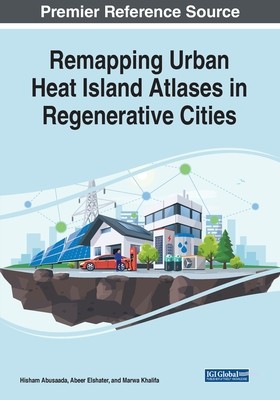
- We will send in 10–14 business days.
- Publisher: Engineering Science Reference
- ISBN-10: 1668424630
- ISBN-13: 9781668424636
- Format: 17.8 x 25.4 x 1.6 cm, softcover
- Language: English
- SAVE -10% with code: EXTRA
Remapping Urban Heat Island Atlases in Regenerative Cities (e-book) (used book) | bookbook.eu
Reviews
Description
In the past decades, protecting the urban environment in the face of environmentalism and environmental rights has become crucial to saving the planet from the dangers of the rapid urban development of new cities and societies. Air temperature is one of the factors influenced by climate change and contemporary city morphology that lacks compact city features. Contemporary cities have taken on global paradigms, adopting open-fabric, multiple, and ultrahigh residential towers and superhuman-scale spaces at the level of squares and public parks. This type of planning results in a radical thermal transformation not only in the movement and transportation network, but also in all public spaces and their external spaces. It is essential to understand the dimensions and principles of urban planning and design in conjunction with the competence of environmental design to reduce the impact of the urban heat island (UHI) phenomenon. Remapping Urban Heat Island Atlases in Regenerative Cities focuses on public health and wellbeing, decent work and economic growth, sustainable cities and societies, and climate action. It presents atlases of UHI-based digital techniques and methods of modelling as well as the use of these atlases, mapping, and models in exploring the placemaking problems in the new cities. Covering topics such as artificial intelligence, pedestrian density mapping, and urban heat island mitigation, this premier reference source is a critical resource for architects, city planners, urban planners, city officials, government officials, policymakers, non-profit organizations, politicians, engineers, libraries, students and educators of higher education, researchers, and academicians.
EXTRA 10 % discount with code: EXTRA
The promotion ends in 18d.23:31:41
The discount code is valid when purchasing from 10 €. Discounts do not stack.
- Publisher: Engineering Science Reference
- ISBN-10: 1668424630
- ISBN-13: 9781668424636
- Format: 17.8 x 25.4 x 1.6 cm, softcover
- Language: English English
In the past decades, protecting the urban environment in the face of environmentalism and environmental rights has become crucial to saving the planet from the dangers of the rapid urban development of new cities and societies. Air temperature is one of the factors influenced by climate change and contemporary city morphology that lacks compact city features. Contemporary cities have taken on global paradigms, adopting open-fabric, multiple, and ultrahigh residential towers and superhuman-scale spaces at the level of squares and public parks. This type of planning results in a radical thermal transformation not only in the movement and transportation network, but also in all public spaces and their external spaces. It is essential to understand the dimensions and principles of urban planning and design in conjunction with the competence of environmental design to reduce the impact of the urban heat island (UHI) phenomenon. Remapping Urban Heat Island Atlases in Regenerative Cities focuses on public health and wellbeing, decent work and economic growth, sustainable cities and societies, and climate action. It presents atlases of UHI-based digital techniques and methods of modelling as well as the use of these atlases, mapping, and models in exploring the placemaking problems in the new cities. Covering topics such as artificial intelligence, pedestrian density mapping, and urban heat island mitigation, this premier reference source is a critical resource for architects, city planners, urban planners, city officials, government officials, policymakers, non-profit organizations, politicians, engineers, libraries, students and educators of higher education, researchers, and academicians.


Reviews